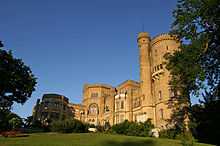Babelsberg Palace

Babelsberg Palace (German: Schloss Babelsberg) lies in the eponymous park and quarter of Potsdam, the capital of the German state of Brandenburg. For over 50 years it was the summer residence of Prince William, later Emperor William I and his wife, Augusta of the House of Saxe-Weimar. On 22 September 1862 in the palace and adjoining park the discussion between King William I and Bismarck took place that ended with the nomination of Bismarck as Minister President and Foreign Minister of Prussia. The building, designed in the English Gothic style, was built in two phases over the period 1835–1849. The contract to plan the palace was given to the architects Karl Friedrich Schinkel, Ludwig Persius and Johann Heinrich Strack.
Babelsberg Palace is managed by the Berlin-Brandenburg Foundation for Prussian Palaces and Gardens (Stiftung Preußische Schlösser und Gärten Berlin-Brandenburg) and is protected by UNESCO as a world heritage site within the Potsdam ensemble. The architecture of Babelsberg Palace formed the template for the construction of Kittendorf Palace between 1848 and 1853 in Mecklenburg-Vorpommern, by Schinkel's pupil, Friedrich Hitzig.
Since 2013, the Palace is undergoing an intense renovation of its facades and interiors.
External links
| Wikimedia Commons has media related to Babelsberg Palace. |
Literature
- Amtlicher Führer der Stiftung Preußische Schlösser und Gärten Berlin-Brandenburg: Park und Schloss Babelsberg. 3rd edition, 1999
- Gert Streidt, Klaus Frahm: Potsdam. Die Schlösser und Gärten der Hohenzollern. Könemann Verlagsgesellschaft mbH. Cologne, 1996. ISBN 3-89508-238-4
- Georg Poensgen: Schloss Babelsberg. Deutscher Kunstverlag, Berlin 1929.
Coordinates: 52°24′28″N 13°05′36″E / 52.407639°N 13.093289°E
| |||||